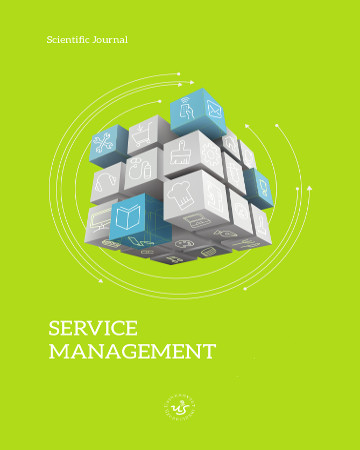
ISSN: 2450-8535
eISSN: 2353-2858
OAI
DOI: 10.18276/ejsm.2016.17/1-07


Lista wydań /
Vol. 17, 1/2016
Analysis of Multidimensional Information Structures in Economic Service Process – Nonlinear Approach
| Autorzy: |
Elżbieta
Skąpska
Bialystok University of Technology |
| Słowa kluczowe: | multidimensional services as multidimensional provider transformations information rationalization of economic activity |
| Data publikacji całości: | 2016 |
| Liczba stron: | 6 (51-56) |
Abstrakt
In the field of human relationships there are currently new multidimensional information technologies from the productive sector that interfere in things, and subjective “face-to-face” interactions characteristic of services are replaced with automated internet connections. In this respect advancing automation of services lessens human’s participation in providing services. Until now the research done by economists has included the depiction of “the new economy”, mainly in the field of production, where information is connected to information technology and, at the same time, marginalizing the services. The aim of the article is obtaining a model of a rational service provider that functions in multidimensional space of their activity: classical (direct) and digital through identifying the stages of a service provision process. In order to achieve the goal hypothetico-deductive and algorithmic methods were applied. The results of the analysis are the contribution to further research. They are the first step towards drawing up comprehensive understanding of the specificity of the process, in which one provides services. However the lack of exact repetition of economic occurrences may constitute a limitation while identifying the abovementioned stages. No exact repetition conditions arise from strong emotional influence under which a service provider is. Nevertheless, the evaluation made in the article may be an incentive to activate the elements responsible for efficiency of a service organization and the elements that eliminate factors destabilizing efficient operation of a service provider.
Pobierz plik
Plik artykułu
Bibliografia
| 1. | Bairi J., Manahar B. M. (2011), “Critical success factors in gaining user customer satisfaction in outsourced IT services”, Journal of Enterprise Information Management, 24 (6), 475-493. |
| 2. | Ball D., Pedro S. (2006), “Service personalization and loyalty”, Journal of Services Marketing, 20 (6), 391-403. |
| 3. | Daszkowska M. (1982), Ekonomika i organizacja usług, Polskie Wydawnictwo Naukowe, Warszawa. |
| 4. | Dołęgowski T. (1995), Usługi a konkurencyjność gospodarki, Instytut Rozwoju i Studiów Strategicznych, Warszawa. |
| 5. | Gleason D. H., Friedman L. (2005), Proposal for an accessible conception of cyberspace, Journal of Information, Communication and Ethics in Society, 3 (1), 15-23.. |
| 6. | Jakimowicz A. J. Juzwiszyn (2012) Vortex Stabilization of Market Equilibrium in Theory and in Practice of Economics, Acta Physica Polonica A, 2012 | 121 | 2B | B-54-B-60 |
| 7. | Juzwiszyn J. (2003). Concerning the Revolution of Financial Spheres. Applications of Physics in Financial Analyses 4. V. n. 27C, Warsaw University of Technology, A97. |
| 8. | Juzwiszyn J. (2008). „DNA rynku”, Zeszyty Naukowe Politechniki Białostockiej Ekonomia i Zarządzanie, 115-127. |
| 9. | Keh H. T., Pang J. (2010), “Customer Reactions to Service Separation”, Journal of Marketing, march, 56-57. |
| 10. | Leibenstein H. (1995), The Supply of Entrepreneurship. Leading Issues in Economic Development. Oxford University, Press, New York, 273-275. |
| 11. | Montaya M. M., Massey A. P., Khatri V. (2010), Connecting IT Services Operations to Services Marketing Practices, Journal of Management Information Systems, 26, 4, 65-85. |
| 12. | Mytlewski A. (2007), Monitoring ekonomiczny przedsiębiorstw, Uniwersytet Gdański, Gdańsk. |
| 13. | Orna E. (1998), Valuing information: problems and opportunities, in: Best D.P. (ed.), The Fourth Resource: Information and its management. Aldershot: Aslib/Gower. |
| 14. | Pagliacci G. R., Kędzior Z. (2006), „Informacyjna rola sprzedawców w przedsiębiorstwie”, Marketing i Rynek, 11, 2-6. |
| 15. | Rogoziński K. (2003), Cywilizacja usługowa – samorealizujące się niespełnienie, Akademia Ekonomiczna w Poznaniu, Poznań. |
| 16. | Rogoziński K. (2010), Zarys pozytywnej teorii usług, Zeszyty Naukowe Uniwersytetu Ekonomicznego w Poznaniu Zarządzanie organizacjami usługowymi, 145, 241-269. |
| 17. | Skąpska E. (2010), „Ekonomiczny wymiar wieloaspektowego podejścia do przedsiębiorczości usługowej”, Zeszyty Naukowe Uniwersytetu Ekonomicznego w Poznaniu Zarządzanie organizacjami usługowymi, 145, 213-225. |
| 18. | Skąpska E. (2012), „Usługa informacyjna jako rezultat współpracy międzyorganizacyjnej”, Zeszyty Naukowe Uniwersytetu Ekonomicznego w Poznaniu Zarządzanie organizacjami usługowymi, 229, 234-248. |
| 19. | Skąpska E. (2014), „Oblicza racjonalności w ekonomice usług”, Zeszyty Naukowe Uniwersytetu Ekonomicznego w Katowicach Studia Ekonomiczne, 180, 213-225. |
| 20. | Stefanowicz B. (2004), Informacja, Szkoła Główna Handlowa, Warszawa. |
| 21. | Styś A. (red.) (2003), Marketing usług, Polskie Wydawnictwo Ekonomiczne, Warszawa. |
| 22. | Wachowska M. (2003), „Rola bezpośrednich inwestycji zagranicznych w rozpraszaniu się know-how”, Ekonomia, 11, 3-4. |
| 23. | Winiarski J. (2003), „Sieci komputerowe w biznesie”, Informatyka Ekonomiczna, 11, 42-44. |